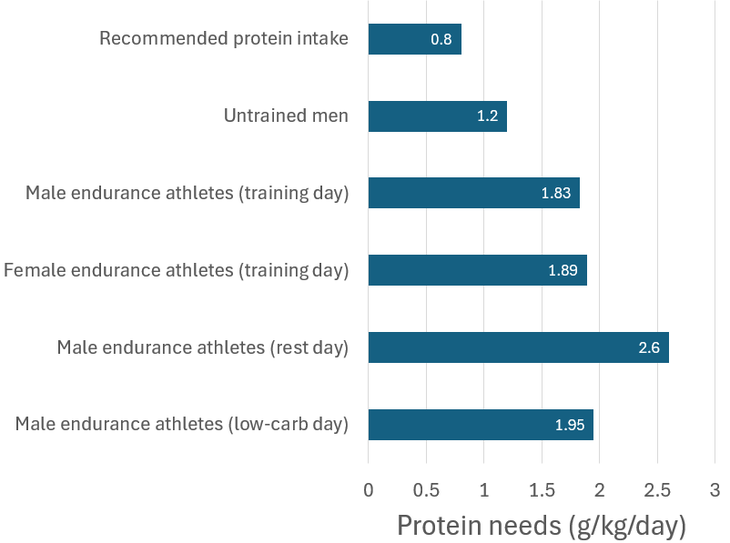
You’d have a hard time finding any serious endurance athlete in 2025 who thinks protein doesn’t matter. Gone are the carb-centric days of pasta and Gatorade and nothing else. But figuring out how much protein runners, cyclists, and other endurance junkies actually need—and when they need it—remains a work in progress.
I’ve grappled with these questions a few times recently—in a piece busting some common protein myths, and in another discussing the idea of maximum protein intake. But now a new review paper in Sports Medicine, from a research team led by Oliver Witard of King’s College London, offers a comprehensive overview of the current state of knowledge. Witard and his colleagues focus on two key questions. First, how much protein do endurance athletes need on a daily basis to stay healthy and optimize long-term training adaptations? And second, what role can the tactical use of protein play in speeding up short-term recovery and boosting performance?
Protein for the Long Term
Government guidelines currently recommend getting at least 0.8 grams of protein per kilogram of body weight (g/kg) each day. For someone who weighs 150 pounds, that works out to 55 grams of protein. For reference, a standard 5-ounce can of tuna has about 20 grams of protein.
There are two main problems with this guideline, however. First, it’s intended to be the minimum required to stay healthy, not the optimal amount to maximize performance. Second, it was formulated using a measurement technique that involves tracking the amount of nitrogen being consumed and excreted from the body, which some scientists believe underestimates protein needs. A newer approach called the “indicator amino acid oxidation method,” which involves labeling one specific type of amino acid with a carbon isotope to see how quickly it’s burned, gives higher numbers and is also more practical for testing specific populations like athletes.
The usual argument for getting lots of protein is that it provides the building blocks—amino acids—for building new muscle. That’s important for strength training, but endurance athletes need it for other reasons. One is that these building blocks are used to repair the muscle damage incurred by hard training: the longer and harder you run, the more damage you incur, and more protein you presumably need for repairs.
During prolonged exercise, your body also starts burning amino acids for fuel. The amounts are generally small, and how much you burn depends on the nature of the exercise and what else you’re eating, but in some cases 5 to 10 percent of the fuel you need for a given workout is provided by protein. If you’re training hard, you’ll need to eat extra protein to replace those losses.
There are some more subtle possibilities, too. Muscle isn’t the only part of the body that’s built from protein. One of the key adaptations athletes gain from endurance training is an increase in the amount of protein in the mitochondria, where cellular energy is generated. The more protein in the mitochondria, the more efficiently it creates energy. A few studies have sought to figure out whether eating more protein boosts the mitochondrial response to exercise. The results so far haven’t been convincing, but it’s still an open question.
Witard and his colleagues pooled data from various indicator amino acid studies to assess protein needs for endurance athletes under various conditions. Here are some of the key numbers:

The indicator amino acid data suggests that even untrained people need about 1.2 g/kg of protein per day, 50 percent more than the FDA’s recommended daily intake of 0.8 g/kg. And endurance athletes need another 50 percent more than untrained people, with a level of 1.8 g/k/g ensuring that 95 percent of people are getting all the protein their bodies can use. In comparison, studies using the same indicator amino acid method find that resistance-trained athletes need somewhere between 1.5 and 2.0 g/kg per day, raising the possibility that endurance athletes might actually need more protein than lifters.
There’s an important point to bear in mind, though: endurance athletes also tend to eat a lot more than the average person, which means they automatically get more protein. Current protein intake among American adults averages 1.25 g/kg for men and 1.09 g/kg for women, pretty close to the overall target of 1.2 g/kg for untrained people. In comparison, one study found that endurance athletes average 1.4 to 1.5 g/kg—not quite at the 1.8 g/kg level, but not that far away.
There are some other nuances in that graph. Data on male-female differences is very sparse, but there are some hints that women might require more than men relative to their body weight. That might be particularly true during the luteal phase of the menstrual cycle, since progesterone can affect protein burning. Witard and his colleagues make a blanket recommendation that both male and female endurance athletes should aim for 1.8 g/kg, but they throw in the speculative possibility that females “may consider” upping it to 1.9 g/kg during the luteal phase of their cycle.
Short-Term Protein Tactics
The big surprise in the data above is that endurance athletes seem to use more protein on their rest days than on training days. This finding has popped up in a few studies, and it’s definitely not what the scientists were expecting. It’s possible that there’s some quirk of metabolism that’s skewing the measurements used to assess protein needs when you try to compare exercise and non-exercise days.
But it’s also possible that the effect is real—that when you give your body a break, its repair and adaptation mechanisms kick into overdrive and thus use more protein than usual. If this is true, it’s an argument for upping your protein intake on rest days: Witard and co. suggest aiming for 2.0 g/kg. And on a more fundamental level, it’s an argument for including true rest days in your training program periodically, since they seem to trigger recovery processes that don’t happen on normal training days. At this point, I’d say the jury is still out on whether the effect is real.
Either way, the researchers suggest aiming for 0.5 g/kg of protein following exercise to help repair any muscle damage incurred during the workout. For a 150-pound person, that’s 34 grams of protein, which is what you’d get in a substantial meal with a good protein source. How soon is “after exercise”? I don’t think there’s any convincing data that says it has to be immediately after. Your next meal is fine—unless your workout was after dinner and you’re planning to head to bed, in which case you should make a special effort to get some protein in.
The data also suggests that athletes use more protein when they’re training in a carbohydrate-depleted state. In this case, we’re not talking about a consistently low-carb diet, but rather doing certain training sessions in a low-carb state to help the body adapt to burning fat more efficiently. There’s decent evidence that protein can help power these workouts, and Witard suggests taking in 10 to 20 grams of protein before and/or during this type of session.
This idea of using protein to compensate for low carbs also connects to one of the most hotly debated ideas about protein for endurance athletes. There have been various research-backed claims over the years that adding protein to a sports drink that you consume during a race or training session will enhance your performance, and that taking in some protein in the immediate post-workout window will speed up the rate at which you refill the carbohydrate stores in your muscles.
All these claims, Witard and his colleagues argue, are the result of studies where the subjects didn’t get enough carbohydrates. If you’re meeting your carb needs, adding protein to a sports drink will neither boost your performance nor accelerate your muscle refueling. There may be exceptions for ultra-endurance events, which haven’t been well-studied and have somewhat different metabolic challenges compared to a marathon. But the researchers’ final conclusion is a reminder that for endurance athletes, despite protein’s current popularity, carbohydrate is still king.
For more Sweat Science, join me on Threads and Facebook, sign up for the email newsletter, and check out my new book The Explorer’s Gene: Why We Seek Big Challenges, New Flavors, and the Blank Spots on the Map.
The post New Research Says Endurance Athletes May Need as Much Protein as Weight Lifters appeared first on Outside Online.















